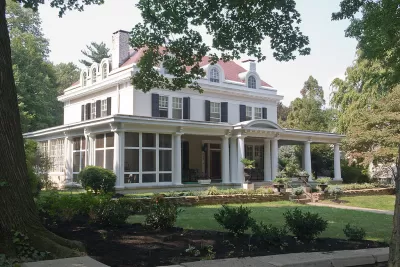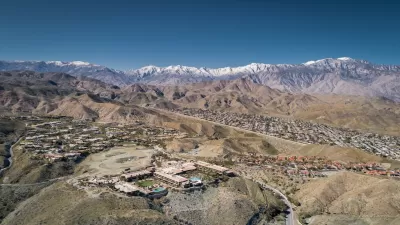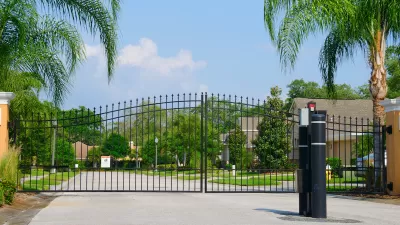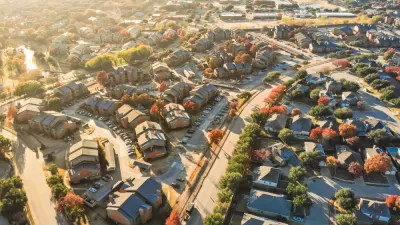Exploring the surprising origins of the American suburbs.

Paige Glotzer examines the history of exclusionary housing in a big, interactive post on the Harvard Faculty of Arts and Sciences website. The article traces the history from the 1890s, with the rise of segregated planned suburbs in the United States made possible by British investments, through the 1960s, where the legacy of one company's investments was still evident in Baltimore.
"Suburbs may seem uniquely American, yet Caribbean slavery, British industrialization, imperialism, and even the battles for women’s rights all directly affected who invested in them and where the capital came from," according to Glotzer. "Egypt, India, Antigua, the Congo served as some of the other sources of wealth for those who financed America’s segregated suburbs."
Glotzer also explains the significance of this history: "determining who bankrolled the start of modern American housing segregation sharpens our understanding of why exclusion assumed particular forms and allowed people—such as developers and certain homeowners—to stake new claims to power."
The article presents numerous historic documents, infographics, and Esri storymaps in an interactive feature.
FULL STORY: The Business of Exclusionary Housing Markets, 1890-1960

Study: Maui’s Plan to Convert Vacation Rentals to Long-Term Housing Could Cause Nearly $1 Billion Economic Loss
The plan would reduce visitor accommodation by 25,% resulting in 1,900 jobs lost.

North Texas Transit Leaders Tout Benefits of TOD for Growing Region
At a summit focused on transit-oriented development, policymakers discussed how North Texas’ expanded light rail system can serve as a tool for economic growth.

Using Old Oil and Gas Wells for Green Energy Storage
Penn State researchers have found that repurposing abandoned oil and gas wells for geothermal-assisted compressed-air energy storage can boost efficiency, reduce environmental risks, and support clean energy and job transitions.

Private Donations Propel Early Restoration of Palisades Playground
Los Angeles has secured over $1.3 million in private funding to restore the Pacific Palisades playground months ahead of schedule, creating a modern, accessible space that supports community healing after recent wildfires.

From Blight to Benefit: Early Results From California’s Equitable Cleanup Program
The Equitable Community Revitalization Grant (ECRG) program is reshaping brownfield redevelopment by prioritizing projects in low-income and environmental justice communities, emphasizing equity, transparency, and community benefits.

Planting Relief: Tackling Las Vegas Heat One Tree at a Time
Nevada Plants, a Las Vegas-based nonprofit, is combating the city’s extreme urban heat by giving away trees to residents in underserved neighborhoods, promoting shade, sustainability, and community health.
Urban Design for Planners 1: Software Tools
This six-course series explores essential urban design concepts using open source software and equips planners with the tools they need to participate fully in the urban design process.
Planning for Universal Design
Learn the tools for implementing Universal Design in planning regulations.
Ascent Environmental
Borough of Carlisle
Institute for Housing and Urban Development Studies (IHS)
City of Grandview
Harvard GSD Executive Education
Toledo-Lucas County Plan Commissions
Salt Lake City
NYU Wagner Graduate School of Public Service





























